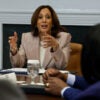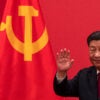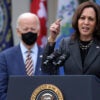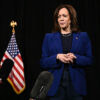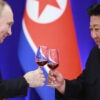Secretary of State Hillary Clinton gave a major foreign policy speech at the Council on Foreign Relations earlier today touting the Obama Administration’s foreign policy. The speech was wide ranging. The bulk of the speech was populated by platitudes and generalities intended to emphasize the Administration’s dedication to maintaining America’s global leadership role, revitalizing alliances, resolving international problems, and commitment to helping countries develop. All worthy aspirations to be sure, but they are ultimately empty words without evidence of achievement or at least progress toward achievement. That is where the questionable nature of the Administration’s foreign policy becomes evident.
According to Secretary Clinton:
We are working to support direct talks between the Israelis and Palestinians, and next week I will travel to Egypt and Jerusalem for the second round of negotiations. In Iraq, where our combat mission has ended, we are transitioning to a civilian-led partnership. We are stepping up international pressure on Iran to negotiate seriously on its nuclear program. We are working with Pakistan as it recovers from devastating floods and combats violent extremism. And of course the war in Afghanistan is always at the top of the agenda.
This list only serves to reveal the stark lack of substantive achievement on the major foreign policy priorities of the Administration. Aside from Iraq, where the transition was paved by the previous Administration, the list is one of stalled efforts and questionable decisions.
The speech also contained the obligatory reflexive swipes at the previous Administration: “With Russia, we took office amid talk of cooling relations and a return to Cold War suspicion…. Let’s examine the Asia-Pacific region. When we took office, there was a perception—fair or not—that America was absent. So the Obama Administration made it clear from the beginning that the United States was back.”
Some parts of the speech were downright offensive. Take this quote for instance:
We are upholding and defending the universal values that are enshrined in the UN Charter and the Universal Declaration of Human Rights. Today these principles are under threat. In too many places, new democracies are struggling to grow strong roots. Authoritarian regimes are cracking down on civil society and pluralism. Some leaders see democracy as an inconvenience that gets in the way of the efficient exercise of national power.
This world-view must be confronted and challenged. Democracy needs defending. The struggle to make human rights a human reality needs champions.
This work starts at home, where we have rejected the false choice between our security and our ideals.
To casually equate the crackdowns by authoritarian regimes and internal political debate over American policies—whether referencing to U.S. treatment of detainees in Guantanamo or the immigration debate exemplified by the Arizona legal challenge or the debate over the Ground Zero mosque or some other issue—is indefensible.
However, not all of the speech was bad. Secretary Clinton’s discussion on “Global Institutions for the 21st Century” is worth highlighting because it may represent a triumph of experience over naiveté:
So our fifth step has been to reengage with global institutions and begin modernizing them to meet the evolving challenges of the 21st century. We need institutions that are flexible, inclusive, and complementary, instead of competing with one another for jurisdiction. Institutions that encourage nations to play productive roles, that marshal common efforts, and enforce the system of rights and responsibilities that binds us all.
The United Nations remains the single most important global institution and we are constantly reminded of its value: The Security Council enacting sanctions against Iran and North Korea. Peacekeepers patrolling the streets of Monrovia and Port-au-Prince. Aid workers assisting flood victims in Pakistan and displaced people in Darfur. And, most recently, the UN General Assembly establishing a new entity -UN Women-which will promote gender equality, expand opportunity for women and girls, and tackle the violence and discrimination they face.
But we are also constantly reminded of its limitations. It is difficult for the UN’s 192 Member States, with their diverse perspectives and interests, to achieve consensus on institutional reform, especially reforming the Security Council itself. The United States believes that the Council must be able to react to and reflect today’s world. We favor Security Council reform that enhances the UN’s overall performance, effectiveness and efficiency to meet the challenges of the new century. We equally and strongly support operational reforms that enable UN field missions to deploy more rapidly, with adequate numbers of well-equipped and well-trained troops and police they often lack, and with the quality of leadership and civilian expertise they require. And we will continue to embrace and advocate management reforms that lead to efficiencies and savings and that prevent waste, fraud and abuse.
The UN was never intended to tackle every challenge, nor should it. So when appropriate, we are working with our partners to establish new venues and organizations to focus on specific problems.
Considering that the Obama Administration’s “smart power” foreign policy, with its emphasis on using and working through international institutions, is commonly perceived to be a refutation of the Bush Administration’s “unilateral” foreign policy, Secretary Clinton’s characterization of the United Nations in her speech today is remarkable. Sure, the United Nations is declared to be the “the single most important global institution.” But what does that mean? What other truly “global” institutions are there outside of the U.N. system? When standing alone, it is easy to be the most important.
What about value? Secretary Clinton’s examples, presumably among the best she has, are hardly convincing. For instance:
- Security Council sanctions against Iran and North Korea are useful, but hardly decisive. Without cooperation and observance from China and Russia, the sanctions are greatly blunted. Their cooperation has not been secured despite the Administration’s plaintive efforts.
- U.N. Peacekeepers often do good work, but U.N. peacekeeping also has serious problems and weaknesses. Thus far, the U.S. mission has been absent in Turtle Bay when it comes to pressing for U.N. reform.
- U.N. humanitarian efforts are certainly useful and the dedication of U.N. workers is admirable, but is it indispensable? Humanitarian efforts, including those in Haiti and Pakistan, are often initiated and facilitated by NGOs and backed by U.S. bilateral and regional government aid and support. U.N. coordination helps, but the humanitarian assistance would likely be welcome without U.N. involvement.
- As for the U.N. General Assembly creating a new organization to promote gender equality, one only has to realize that Iran (which recently sentenced a woman to be stoned death for adultery) was elected earlier this year to U.N. Commission on the Status of Women to gauge the seriousness of the U.N. General Assembly’s dedication to women’s rights.
Secretary Clinton implicitly acknowledges the limited value of the U.N. in her next paragraph which highlights the problems of the U.N. and the need for reform. This may be a rhetorical acknowledgement of U.N. problems—the U.N. has a well-earned reputation for ineffectiveness and mismanagement. But it also could be an acknowledgement that working through the U.N. has not been nearly as easy as the Obama officials envisioned it would be during the campaign.
The telling blow, however, comes at the end: “The UN was never intended to tackle every challenge, nor should it. So when appropriate, we are working with our partners to establish new venues and organizations to focus on specific problems.” Ambassador John Bolton would have been comfortable making that point and it echoes the recommendations that The Heritage Foundation experts have been making for years in publications like Liberty’s Best Hope and ConUNdrum: The Limits of the United Nations and the Search for Alternatives. The fact that the most pro-U.N. U.S. Administration in decades is conceding that the U.N. is a niche effort and that progress on addressing problems requires alternative organizations is a damning indictment of the organization.



